Analyzing Smart Contracts vs. Conventional Contracts in Modern Law
VerifiedAdded on 2023/06/11
|11
|2881
|239
Essay
AI Summary
This essay provides a comparative analysis of smart contracts and conventional contracts, examining their respective advantages and disadvantages within a legal context. It defines smart contracts as self-executing agreements driven by computer code and contrasts them with traditional contracts, highlighting differences in certainty, speed, and cost. The essay also addresses the human factor, uncertain legal status, and implementation costs associated with smart contracts. Furthermore, it outlines the six essential elements of a simple valid contract—offer, acceptance, consideration, legality, capacity, and intent—emphasizing their importance in ensuring a legally binding agreement. The analysis concludes by underscoring the potential of smart contracts to reduce human error and automate contractual performance, while also acknowledging the ongoing debates and challenges surrounding their legal regulation and practical implementation. Desklib offers access to similar solved assignments and resources for students.
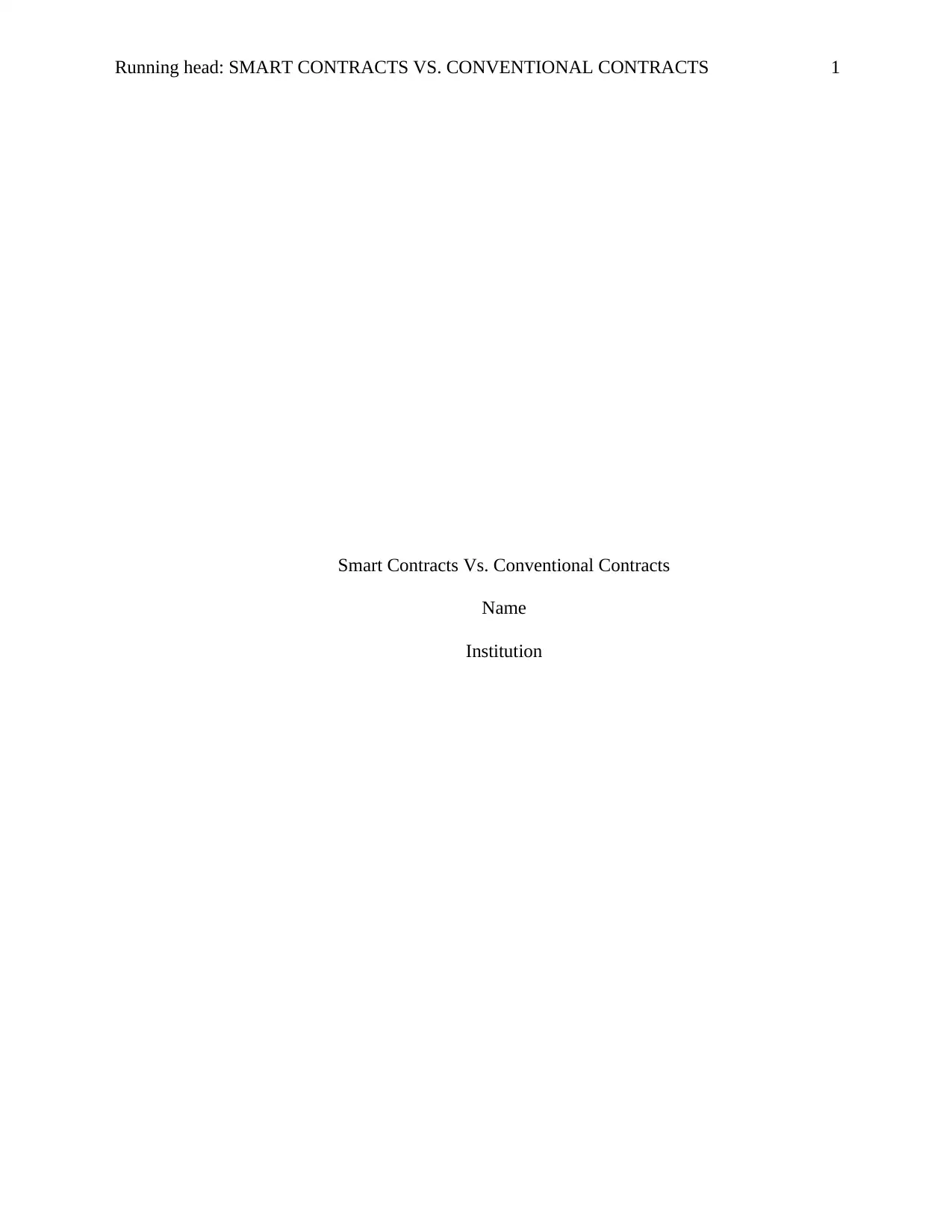
Running head: SMART CONTRACTS VS. CONVENTIONAL CONTRACTS 1
Smart Contracts Vs. Conventional Contracts
Name
Institution
Smart Contracts Vs. Conventional Contracts
Name
Institution
Paraphrase This Document
Need a fresh take? Get an instant paraphrase of this document with our AI Paraphraser
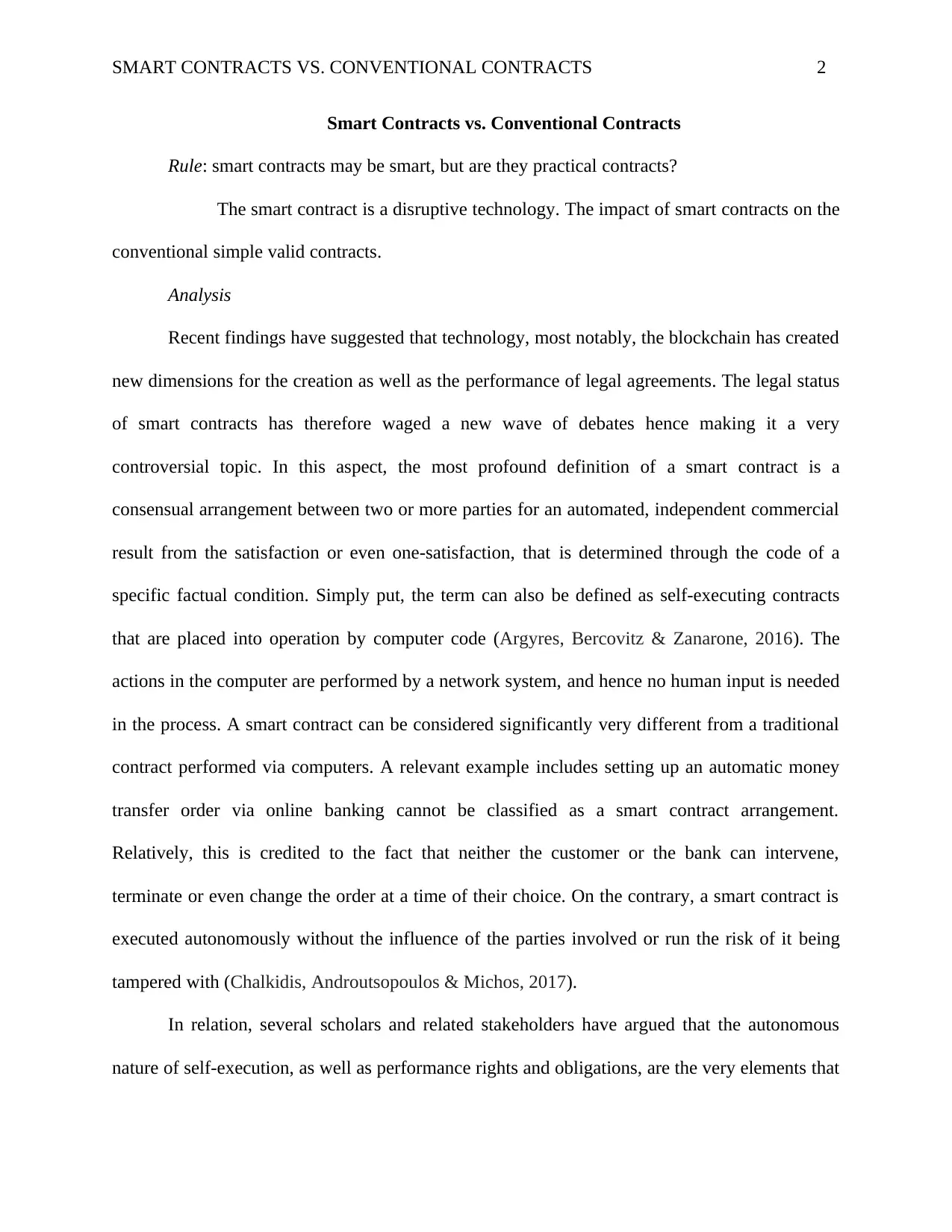
SMART CONTRACTS VS. CONVENTIONAL CONTRACTS 2
Smart Contracts vs. Conventional Contracts
Rule: smart contracts may be smart, but are they practical contracts?
The smart contract is a disruptive technology. The impact of smart contracts on the
conventional simple valid contracts.
Analysis
Recent findings have suggested that technology, most notably, the blockchain has created
new dimensions for the creation as well as the performance of legal agreements. The legal status
of smart contracts has therefore waged a new wave of debates hence making it a very
controversial topic. In this aspect, the most profound definition of a smart contract is a
consensual arrangement between two or more parties for an automated, independent commercial
result from the satisfaction or even one-satisfaction, that is determined through the code of a
specific factual condition. Simply put, the term can also be defined as self-executing contracts
that are placed into operation by computer code (Argyres, Bercovitz & Zanarone, 2016). The
actions in the computer are performed by a network system, and hence no human input is needed
in the process. A smart contract can be considered significantly very different from a traditional
contract performed via computers. A relevant example includes setting up an automatic money
transfer order via online banking cannot be classified as a smart contract arrangement.
Relatively, this is credited to the fact that neither the customer or the bank can intervene,
terminate or even change the order at a time of their choice. On the contrary, a smart contract is
executed autonomously without the influence of the parties involved or run the risk of it being
tampered with (Chalkidis, Androutsopoulos & Michos, 2017).
In relation, several scholars and related stakeholders have argued that the autonomous
nature of self-execution, as well as performance rights and obligations, are the very elements that
Smart Contracts vs. Conventional Contracts
Rule: smart contracts may be smart, but are they practical contracts?
The smart contract is a disruptive technology. The impact of smart contracts on the
conventional simple valid contracts.
Analysis
Recent findings have suggested that technology, most notably, the blockchain has created
new dimensions for the creation as well as the performance of legal agreements. The legal status
of smart contracts has therefore waged a new wave of debates hence making it a very
controversial topic. In this aspect, the most profound definition of a smart contract is a
consensual arrangement between two or more parties for an automated, independent commercial
result from the satisfaction or even one-satisfaction, that is determined through the code of a
specific factual condition. Simply put, the term can also be defined as self-executing contracts
that are placed into operation by computer code (Argyres, Bercovitz & Zanarone, 2016). The
actions in the computer are performed by a network system, and hence no human input is needed
in the process. A smart contract can be considered significantly very different from a traditional
contract performed via computers. A relevant example includes setting up an automatic money
transfer order via online banking cannot be classified as a smart contract arrangement.
Relatively, this is credited to the fact that neither the customer or the bank can intervene,
terminate or even change the order at a time of their choice. On the contrary, a smart contract is
executed autonomously without the influence of the parties involved or run the risk of it being
tampered with (Chalkidis, Androutsopoulos & Michos, 2017).
In relation, several scholars and related stakeholders have argued that the autonomous
nature of self-execution, as well as performance rights and obligations, are the very elements that
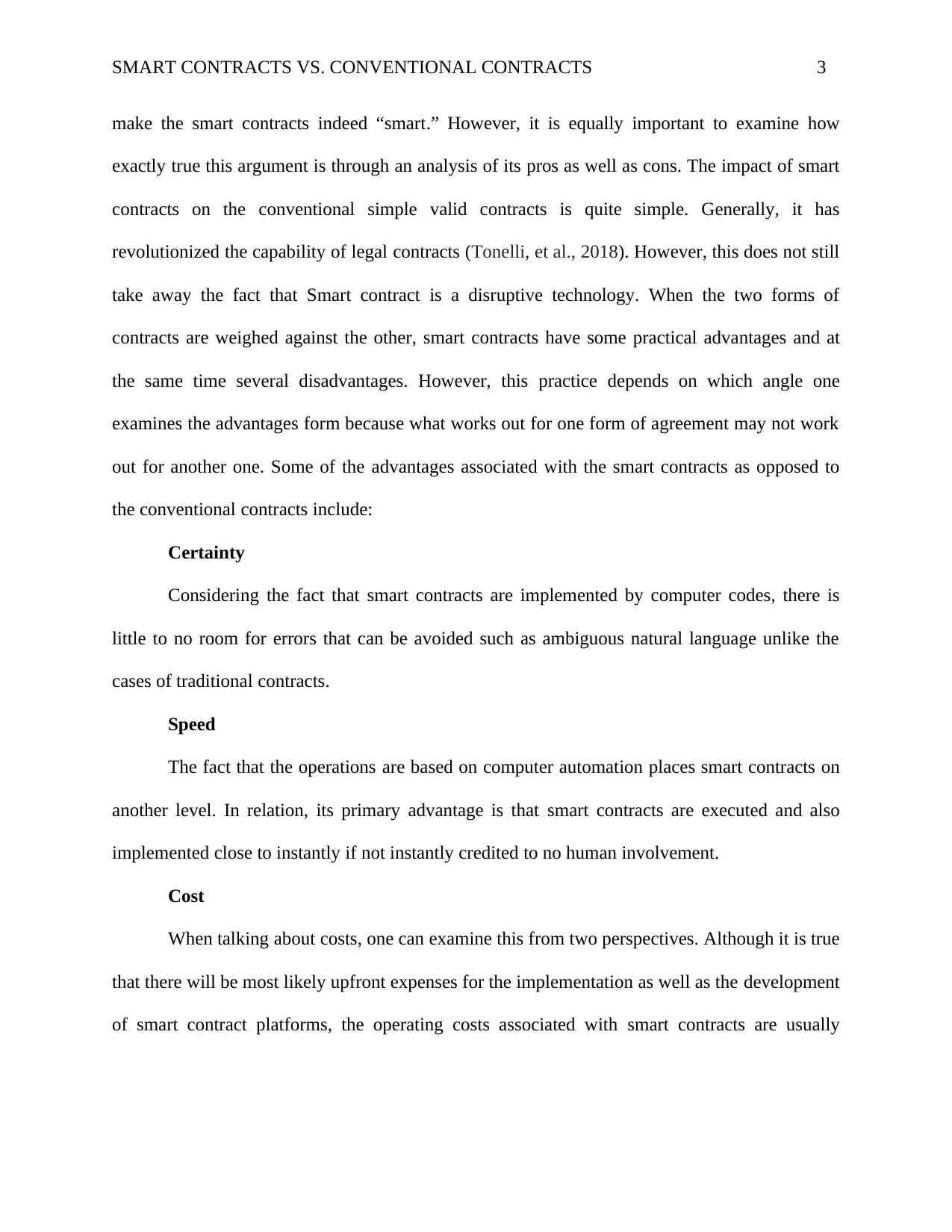
SMART CONTRACTS VS. CONVENTIONAL CONTRACTS 3
make the smart contracts indeed “smart.” However, it is equally important to examine how
exactly true this argument is through an analysis of its pros as well as cons. The impact of smart
contracts on the conventional simple valid contracts is quite simple. Generally, it has
revolutionized the capability of legal contracts (Tonelli, et al., 2018). However, this does not still
take away the fact that Smart contract is a disruptive technology. When the two forms of
contracts are weighed against the other, smart contracts have some practical advantages and at
the same time several disadvantages. However, this practice depends on which angle one
examines the advantages form because what works out for one form of agreement may not work
out for another one. Some of the advantages associated with the smart contracts as opposed to
the conventional contracts include:
Certainty
Considering the fact that smart contracts are implemented by computer codes, there is
little to no room for errors that can be avoided such as ambiguous natural language unlike the
cases of traditional contracts.
Speed
The fact that the operations are based on computer automation places smart contracts on
another level. In relation, its primary advantage is that smart contracts are executed and also
implemented close to instantly if not instantly credited to no human involvement.
Cost
When talking about costs, one can examine this from two perspectives. Although it is true
that there will be most likely upfront expenses for the implementation as well as the development
of smart contract platforms, the operating costs associated with smart contracts are usually
make the smart contracts indeed “smart.” However, it is equally important to examine how
exactly true this argument is through an analysis of its pros as well as cons. The impact of smart
contracts on the conventional simple valid contracts is quite simple. Generally, it has
revolutionized the capability of legal contracts (Tonelli, et al., 2018). However, this does not still
take away the fact that Smart contract is a disruptive technology. When the two forms of
contracts are weighed against the other, smart contracts have some practical advantages and at
the same time several disadvantages. However, this practice depends on which angle one
examines the advantages form because what works out for one form of agreement may not work
out for another one. Some of the advantages associated with the smart contracts as opposed to
the conventional contracts include:
Certainty
Considering the fact that smart contracts are implemented by computer codes, there is
little to no room for errors that can be avoided such as ambiguous natural language unlike the
cases of traditional contracts.
Speed
The fact that the operations are based on computer automation places smart contracts on
another level. In relation, its primary advantage is that smart contracts are executed and also
implemented close to instantly if not instantly credited to no human involvement.
Cost
When talking about costs, one can examine this from two perspectives. Although it is true
that there will be most likely upfront expenses for the implementation as well as the development
of smart contract platforms, the operating costs associated with smart contracts are usually
⊘ This is a preview!⊘
Do you want full access?
Subscribe today to unlock all pages.

Trusted by 1+ million students worldwide
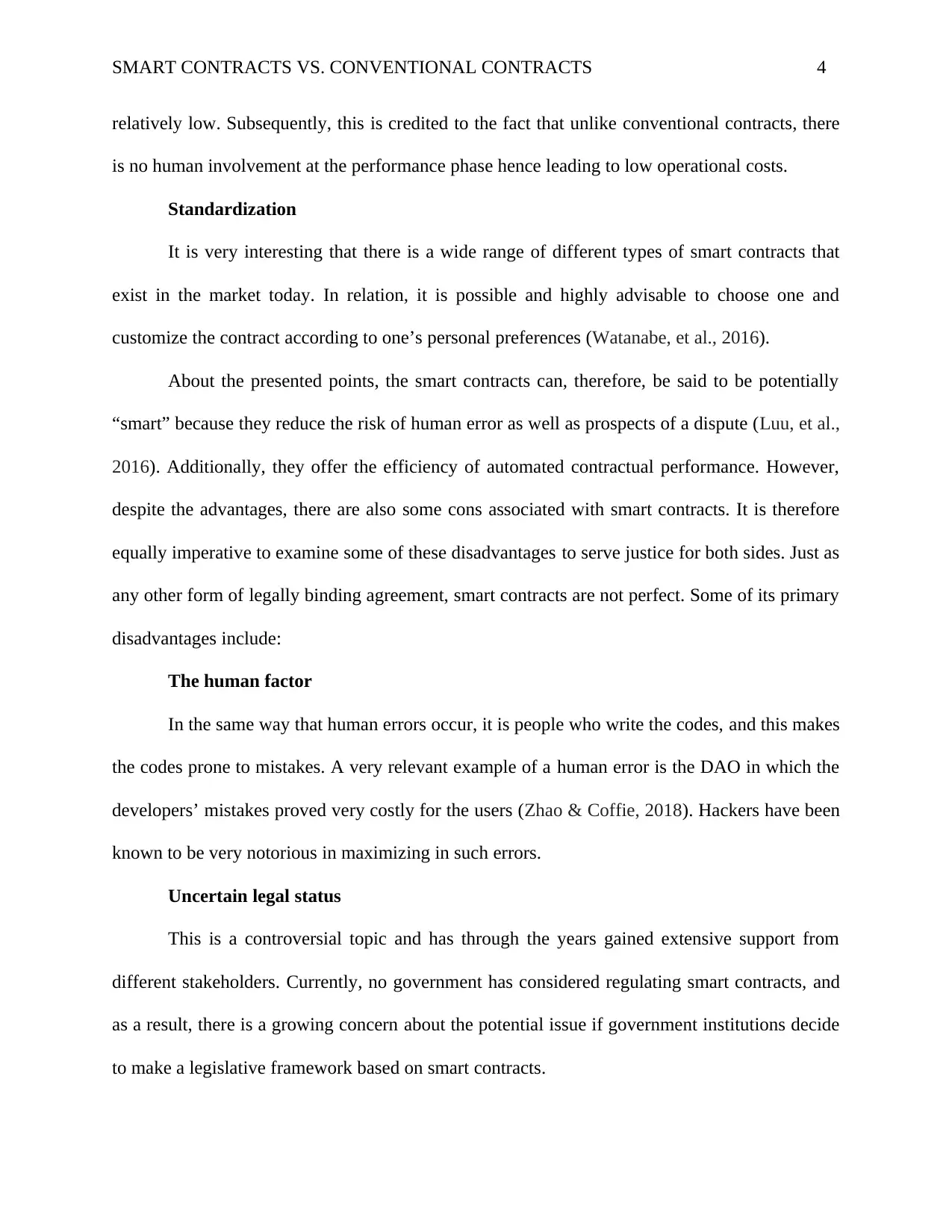
SMART CONTRACTS VS. CONVENTIONAL CONTRACTS 4
relatively low. Subsequently, this is credited to the fact that unlike conventional contracts, there
is no human involvement at the performance phase hence leading to low operational costs.
Standardization
It is very interesting that there is a wide range of different types of smart contracts that
exist in the market today. In relation, it is possible and highly advisable to choose one and
customize the contract according to one’s personal preferences (Watanabe, et al., 2016).
About the presented points, the smart contracts can, therefore, be said to be potentially
“smart” because they reduce the risk of human error as well as prospects of a dispute (Luu, et al.,
2016). Additionally, they offer the efficiency of automated contractual performance. However,
despite the advantages, there are also some cons associated with smart contracts. It is therefore
equally imperative to examine some of these disadvantages to serve justice for both sides. Just as
any other form of legally binding agreement, smart contracts are not perfect. Some of its primary
disadvantages include:
The human factor
In the same way that human errors occur, it is people who write the codes, and this makes
the codes prone to mistakes. A very relevant example of a human error is the DAO in which the
developers’ mistakes proved very costly for the users (Zhao & Coffie, 2018). Hackers have been
known to be very notorious in maximizing in such errors.
Uncertain legal status
This is a controversial topic and has through the years gained extensive support from
different stakeholders. Currently, no government has considered regulating smart contracts, and
as a result, there is a growing concern about the potential issue if government institutions decide
to make a legislative framework based on smart contracts.
relatively low. Subsequently, this is credited to the fact that unlike conventional contracts, there
is no human involvement at the performance phase hence leading to low operational costs.
Standardization
It is very interesting that there is a wide range of different types of smart contracts that
exist in the market today. In relation, it is possible and highly advisable to choose one and
customize the contract according to one’s personal preferences (Watanabe, et al., 2016).
About the presented points, the smart contracts can, therefore, be said to be potentially
“smart” because they reduce the risk of human error as well as prospects of a dispute (Luu, et al.,
2016). Additionally, they offer the efficiency of automated contractual performance. However,
despite the advantages, there are also some cons associated with smart contracts. It is therefore
equally imperative to examine some of these disadvantages to serve justice for both sides. Just as
any other form of legally binding agreement, smart contracts are not perfect. Some of its primary
disadvantages include:
The human factor
In the same way that human errors occur, it is people who write the codes, and this makes
the codes prone to mistakes. A very relevant example of a human error is the DAO in which the
developers’ mistakes proved very costly for the users (Zhao & Coffie, 2018). Hackers have been
known to be very notorious in maximizing in such errors.
Uncertain legal status
This is a controversial topic and has through the years gained extensive support from
different stakeholders. Currently, no government has considered regulating smart contracts, and
as a result, there is a growing concern about the potential issue if government institutions decide
to make a legislative framework based on smart contracts.
Paraphrase This Document
Need a fresh take? Get an instant paraphrase of this document with our AI Paraphraser
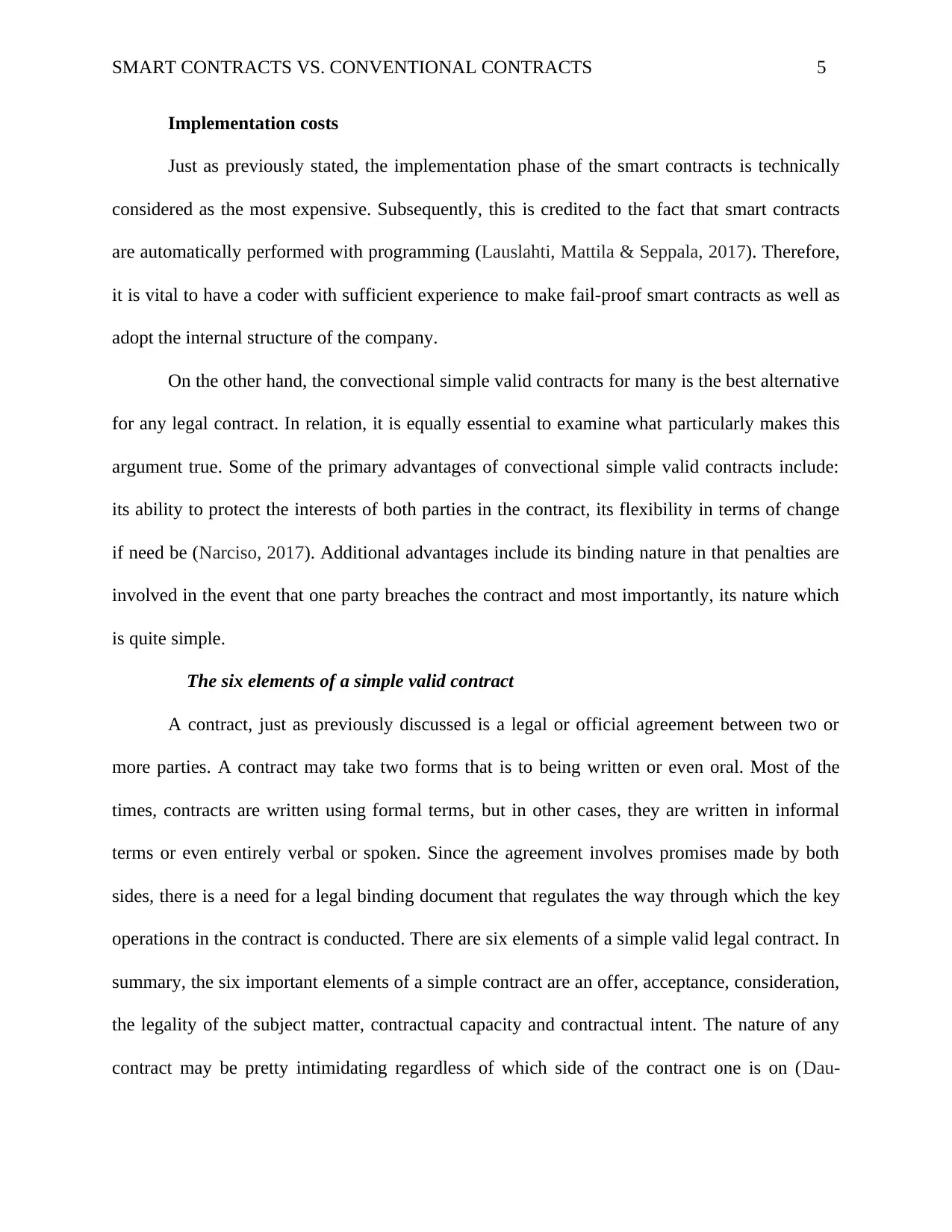
SMART CONTRACTS VS. CONVENTIONAL CONTRACTS 5
Implementation costs
Just as previously stated, the implementation phase of the smart contracts is technically
considered as the most expensive. Subsequently, this is credited to the fact that smart contracts
are automatically performed with programming (Lauslahti, Mattila & Seppala, 2017). Therefore,
it is vital to have a coder with sufficient experience to make fail-proof smart contracts as well as
adopt the internal structure of the company.
On the other hand, the convectional simple valid contracts for many is the best alternative
for any legal contract. In relation, it is equally essential to examine what particularly makes this
argument true. Some of the primary advantages of convectional simple valid contracts include:
its ability to protect the interests of both parties in the contract, its flexibility in terms of change
if need be (Narciso, 2017). Additional advantages include its binding nature in that penalties are
involved in the event that one party breaches the contract and most importantly, its nature which
is quite simple.
The six elements of a simple valid contract
A contract, just as previously discussed is a legal or official agreement between two or
more parties. A contract may take two forms that is to being written or even oral. Most of the
times, contracts are written using formal terms, but in other cases, they are written in informal
terms or even entirely verbal or spoken. Since the agreement involves promises made by both
sides, there is a need for a legal binding document that regulates the way through which the key
operations in the contract is conducted. There are six elements of a simple valid legal contract. In
summary, the six important elements of a simple contract are an offer, acceptance, consideration,
the legality of the subject matter, contractual capacity and contractual intent. The nature of any
contract may be pretty intimidating regardless of which side of the contract one is on (Dau-
Implementation costs
Just as previously stated, the implementation phase of the smart contracts is technically
considered as the most expensive. Subsequently, this is credited to the fact that smart contracts
are automatically performed with programming (Lauslahti, Mattila & Seppala, 2017). Therefore,
it is vital to have a coder with sufficient experience to make fail-proof smart contracts as well as
adopt the internal structure of the company.
On the other hand, the convectional simple valid contracts for many is the best alternative
for any legal contract. In relation, it is equally essential to examine what particularly makes this
argument true. Some of the primary advantages of convectional simple valid contracts include:
its ability to protect the interests of both parties in the contract, its flexibility in terms of change
if need be (Narciso, 2017). Additional advantages include its binding nature in that penalties are
involved in the event that one party breaches the contract and most importantly, its nature which
is quite simple.
The six elements of a simple valid contract
A contract, just as previously discussed is a legal or official agreement between two or
more parties. A contract may take two forms that is to being written or even oral. Most of the
times, contracts are written using formal terms, but in other cases, they are written in informal
terms or even entirely verbal or spoken. Since the agreement involves promises made by both
sides, there is a need for a legal binding document that regulates the way through which the key
operations in the contract is conducted. There are six elements of a simple valid legal contract. In
summary, the six important elements of a simple contract are an offer, acceptance, consideration,
the legality of the subject matter, contractual capacity and contractual intent. The nature of any
contract may be pretty intimidating regardless of which side of the contract one is on (Dau-
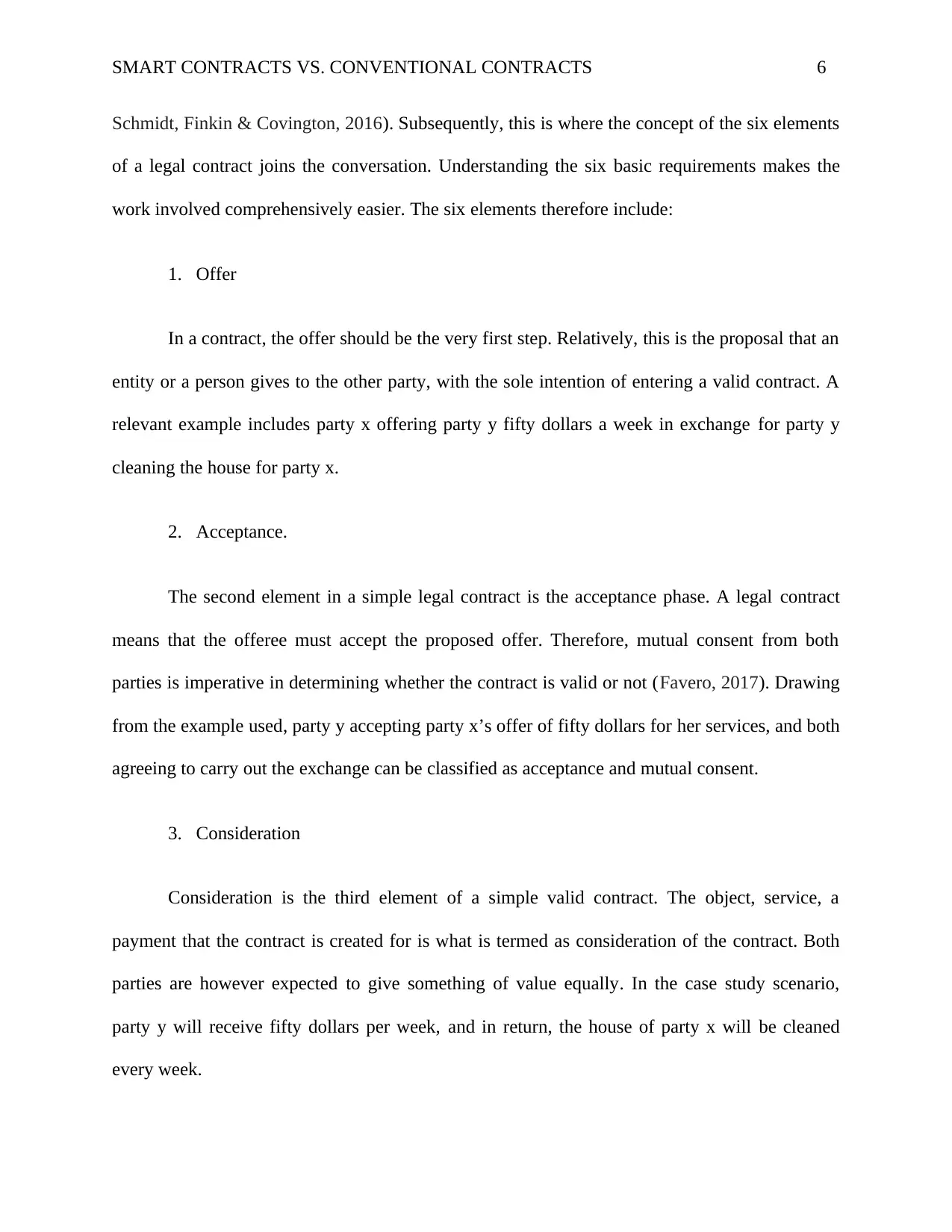
SMART CONTRACTS VS. CONVENTIONAL CONTRACTS 6
Schmidt, Finkin & Covington, 2016). Subsequently, this is where the concept of the six elements
of a legal contract joins the conversation. Understanding the six basic requirements makes the
work involved comprehensively easier. The six elements therefore include:
1. Offer
In a contract, the offer should be the very first step. Relatively, this is the proposal that an
entity or a person gives to the other party, with the sole intention of entering a valid contract. A
relevant example includes party x offering party y fifty dollars a week in exchange for party y
cleaning the house for party x.
2. Acceptance.
The second element in a simple legal contract is the acceptance phase. A legal contract
means that the offeree must accept the proposed offer. Therefore, mutual consent from both
parties is imperative in determining whether the contract is valid or not (Favero, 2017). Drawing
from the example used, party y accepting party x’s offer of fifty dollars for her services, and both
agreeing to carry out the exchange can be classified as acceptance and mutual consent.
3. Consideration
Consideration is the third element of a simple valid contract. The object, service, a
payment that the contract is created for is what is termed as consideration of the contract. Both
parties are however expected to give something of value equally. In the case study scenario,
party y will receive fifty dollars per week, and in return, the house of party x will be cleaned
every week.
Schmidt, Finkin & Covington, 2016). Subsequently, this is where the concept of the six elements
of a legal contract joins the conversation. Understanding the six basic requirements makes the
work involved comprehensively easier. The six elements therefore include:
1. Offer
In a contract, the offer should be the very first step. Relatively, this is the proposal that an
entity or a person gives to the other party, with the sole intention of entering a valid contract. A
relevant example includes party x offering party y fifty dollars a week in exchange for party y
cleaning the house for party x.
2. Acceptance.
The second element in a simple legal contract is the acceptance phase. A legal contract
means that the offeree must accept the proposed offer. Therefore, mutual consent from both
parties is imperative in determining whether the contract is valid or not (Favero, 2017). Drawing
from the example used, party y accepting party x’s offer of fifty dollars for her services, and both
agreeing to carry out the exchange can be classified as acceptance and mutual consent.
3. Consideration
Consideration is the third element of a simple valid contract. The object, service, a
payment that the contract is created for is what is termed as consideration of the contract. Both
parties are however expected to give something of value equally. In the case study scenario,
party y will receive fifty dollars per week, and in return, the house of party x will be cleaned
every week.
⊘ This is a preview!⊘
Do you want full access?
Subscribe today to unlock all pages.

Trusted by 1+ million students worldwide
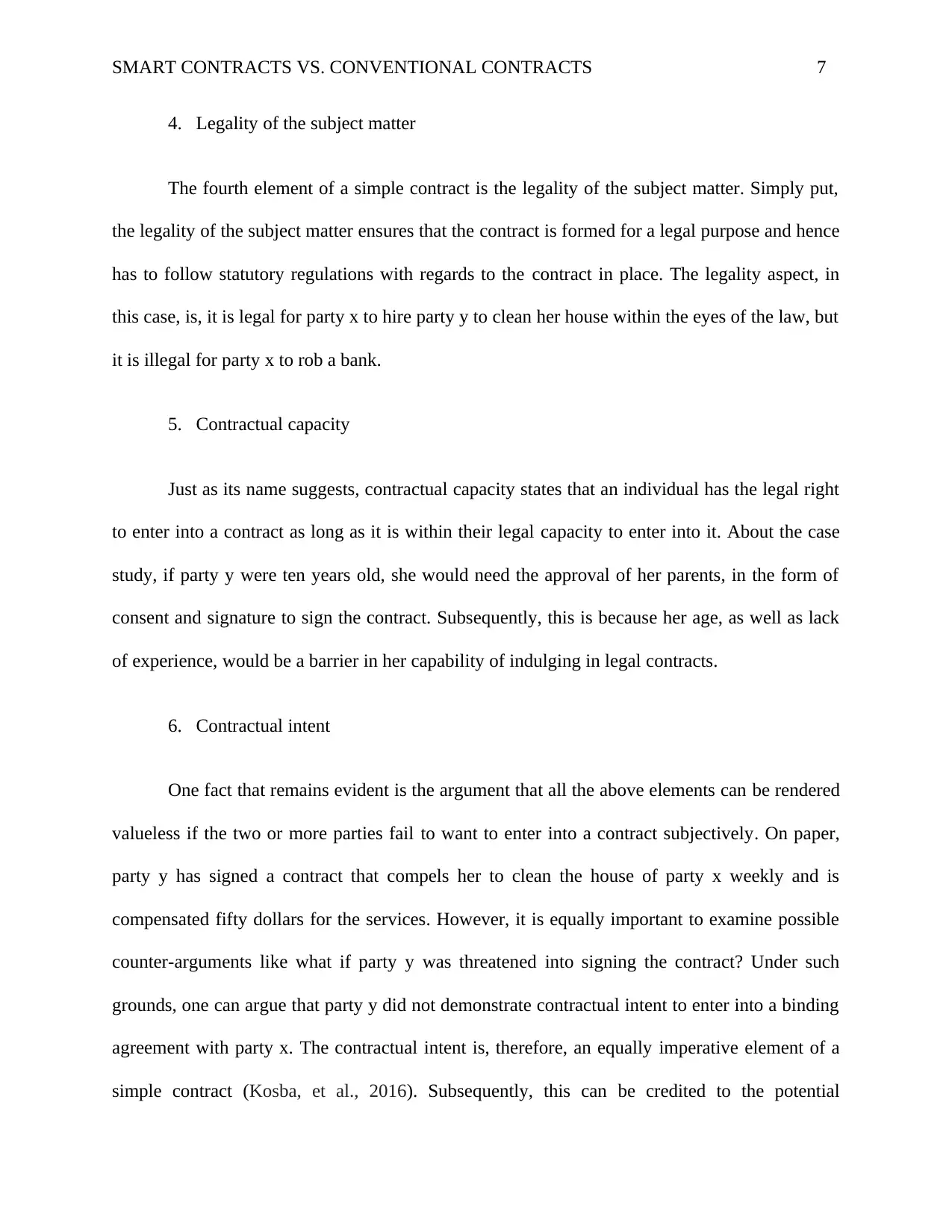
SMART CONTRACTS VS. CONVENTIONAL CONTRACTS 7
4. Legality of the subject matter
The fourth element of a simple contract is the legality of the subject matter. Simply put,
the legality of the subject matter ensures that the contract is formed for a legal purpose and hence
has to follow statutory regulations with regards to the contract in place. The legality aspect, in
this case, is, it is legal for party x to hire party y to clean her house within the eyes of the law, but
it is illegal for party x to rob a bank.
5. Contractual capacity
Just as its name suggests, contractual capacity states that an individual has the legal right
to enter into a contract as long as it is within their legal capacity to enter into it. About the case
study, if party y were ten years old, she would need the approval of her parents, in the form of
consent and signature to sign the contract. Subsequently, this is because her age, as well as lack
of experience, would be a barrier in her capability of indulging in legal contracts.
6. Contractual intent
One fact that remains evident is the argument that all the above elements can be rendered
valueless if the two or more parties fail to want to enter into a contract subjectively. On paper,
party y has signed a contract that compels her to clean the house of party x weekly and is
compensated fifty dollars for the services. However, it is equally important to examine possible
counter-arguments like what if party y was threatened into signing the contract? Under such
grounds, one can argue that party y did not demonstrate contractual intent to enter into a binding
agreement with party x. The contractual intent is, therefore, an equally imperative element of a
simple contract (Kosba, et al., 2016). Subsequently, this can be credited to the potential
4. Legality of the subject matter
The fourth element of a simple contract is the legality of the subject matter. Simply put,
the legality of the subject matter ensures that the contract is formed for a legal purpose and hence
has to follow statutory regulations with regards to the contract in place. The legality aspect, in
this case, is, it is legal for party x to hire party y to clean her house within the eyes of the law, but
it is illegal for party x to rob a bank.
5. Contractual capacity
Just as its name suggests, contractual capacity states that an individual has the legal right
to enter into a contract as long as it is within their legal capacity to enter into it. About the case
study, if party y were ten years old, she would need the approval of her parents, in the form of
consent and signature to sign the contract. Subsequently, this is because her age, as well as lack
of experience, would be a barrier in her capability of indulging in legal contracts.
6. Contractual intent
One fact that remains evident is the argument that all the above elements can be rendered
valueless if the two or more parties fail to want to enter into a contract subjectively. On paper,
party y has signed a contract that compels her to clean the house of party x weekly and is
compensated fifty dollars for the services. However, it is equally important to examine possible
counter-arguments like what if party y was threatened into signing the contract? Under such
grounds, one can argue that party y did not demonstrate contractual intent to enter into a binding
agreement with party x. The contractual intent is, therefore, an equally imperative element of a
simple contract (Kosba, et al., 2016). Subsequently, this can be credited to the potential
Paraphrase This Document
Need a fresh take? Get an instant paraphrase of this document with our AI Paraphraser
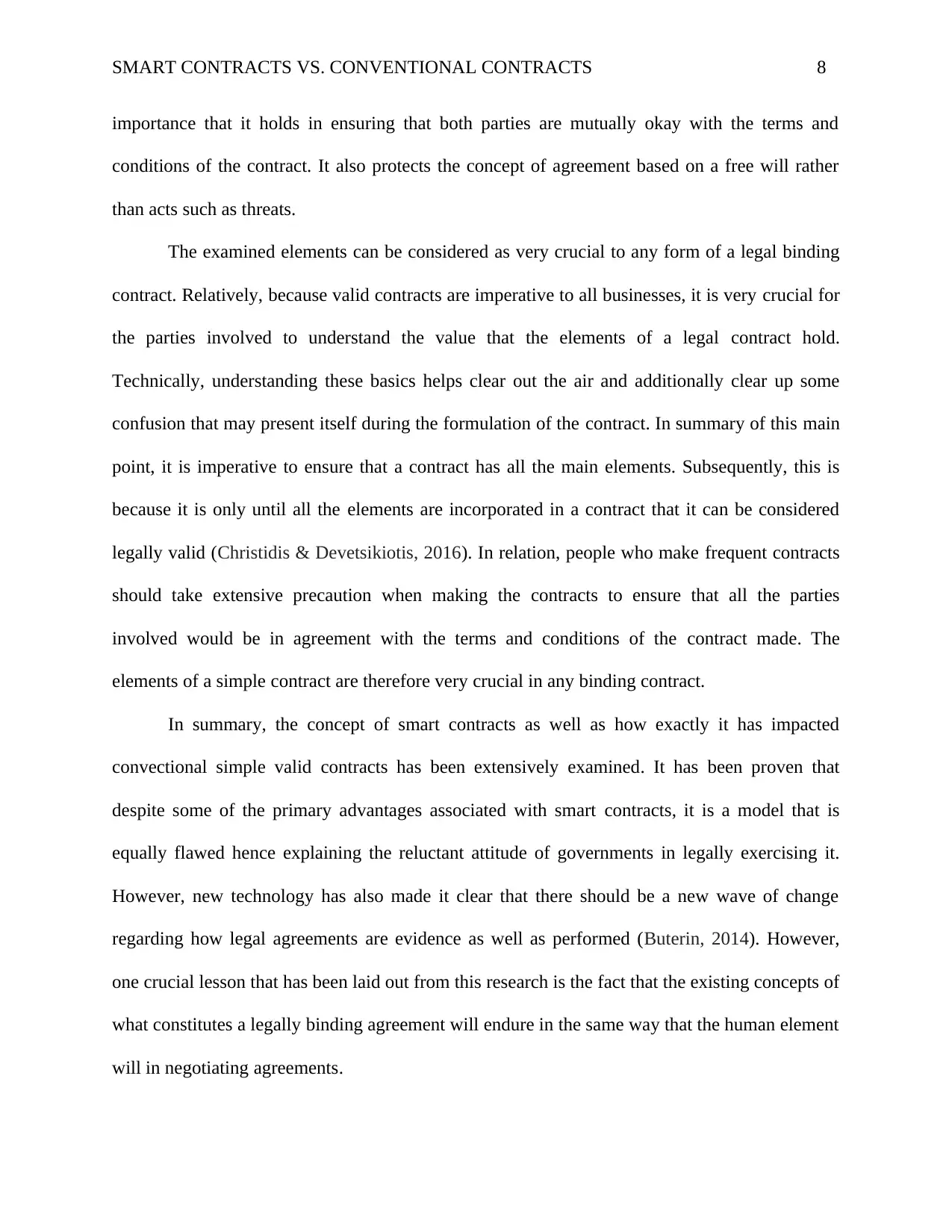
SMART CONTRACTS VS. CONVENTIONAL CONTRACTS 8
importance that it holds in ensuring that both parties are mutually okay with the terms and
conditions of the contract. It also protects the concept of agreement based on a free will rather
than acts such as threats.
The examined elements can be considered as very crucial to any form of a legal binding
contract. Relatively, because valid contracts are imperative to all businesses, it is very crucial for
the parties involved to understand the value that the elements of a legal contract hold.
Technically, understanding these basics helps clear out the air and additionally clear up some
confusion that may present itself during the formulation of the contract. In summary of this main
point, it is imperative to ensure that a contract has all the main elements. Subsequently, this is
because it is only until all the elements are incorporated in a contract that it can be considered
legally valid (Christidis & Devetsikiotis, 2016). In relation, people who make frequent contracts
should take extensive precaution when making the contracts to ensure that all the parties
involved would be in agreement with the terms and conditions of the contract made. The
elements of a simple contract are therefore very crucial in any binding contract.
In summary, the concept of smart contracts as well as how exactly it has impacted
convectional simple valid contracts has been extensively examined. It has been proven that
despite some of the primary advantages associated with smart contracts, it is a model that is
equally flawed hence explaining the reluctant attitude of governments in legally exercising it.
However, new technology has also made it clear that there should be a new wave of change
regarding how legal agreements are evidence as well as performed (Buterin, 2014). However,
one crucial lesson that has been laid out from this research is the fact that the existing concepts of
what constitutes a legally binding agreement will endure in the same way that the human element
will in negotiating agreements.
importance that it holds in ensuring that both parties are mutually okay with the terms and
conditions of the contract. It also protects the concept of agreement based on a free will rather
than acts such as threats.
The examined elements can be considered as very crucial to any form of a legal binding
contract. Relatively, because valid contracts are imperative to all businesses, it is very crucial for
the parties involved to understand the value that the elements of a legal contract hold.
Technically, understanding these basics helps clear out the air and additionally clear up some
confusion that may present itself during the formulation of the contract. In summary of this main
point, it is imperative to ensure that a contract has all the main elements. Subsequently, this is
because it is only until all the elements are incorporated in a contract that it can be considered
legally valid (Christidis & Devetsikiotis, 2016). In relation, people who make frequent contracts
should take extensive precaution when making the contracts to ensure that all the parties
involved would be in agreement with the terms and conditions of the contract made. The
elements of a simple contract are therefore very crucial in any binding contract.
In summary, the concept of smart contracts as well as how exactly it has impacted
convectional simple valid contracts has been extensively examined. It has been proven that
despite some of the primary advantages associated with smart contracts, it is a model that is
equally flawed hence explaining the reluctant attitude of governments in legally exercising it.
However, new technology has also made it clear that there should be a new wave of change
regarding how legal agreements are evidence as well as performed (Buterin, 2014). However,
one crucial lesson that has been laid out from this research is the fact that the existing concepts of
what constitutes a legally binding agreement will endure in the same way that the human element
will in negotiating agreements.

SMART CONTRACTS VS. CONVENTIONAL CONTRACTS 9
Conclusion
The court is likely to find that smart contracts can be considered smart depending on the
perspective that one examines it from. However, with the currently available theoretical as well
as empirical research findings Smart contract is more of a disruptive technology than it is a smart
option.
Conclusion
The court is likely to find that smart contracts can be considered smart depending on the
perspective that one examines it from. However, with the currently available theoretical as well
as empirical research findings Smart contract is more of a disruptive technology than it is a smart
option.
⊘ This is a preview!⊘
Do you want full access?
Subscribe today to unlock all pages.

Trusted by 1+ million students worldwide
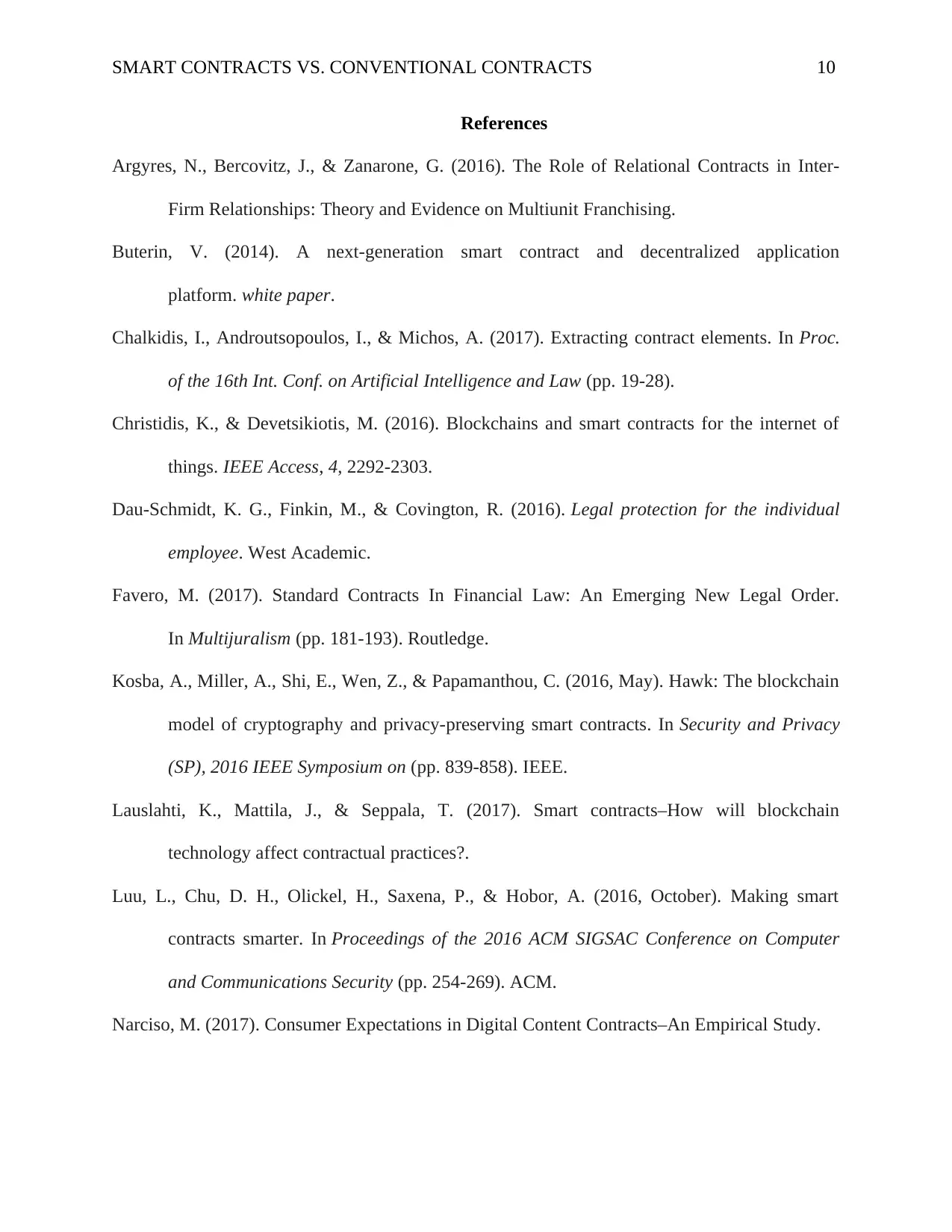
SMART CONTRACTS VS. CONVENTIONAL CONTRACTS 10
References
Argyres, N., Bercovitz, J., & Zanarone, G. (2016). The Role of Relational Contracts in Inter-
Firm Relationships: Theory and Evidence on Multiunit Franchising.
Buterin, V. (2014). A next-generation smart contract and decentralized application
platform. white paper.
Chalkidis, I., Androutsopoulos, I., & Michos, A. (2017). Extracting contract elements. In Proc.
of the 16th Int. Conf. on Artificial Intelligence and Law (pp. 19-28).
Christidis, K., & Devetsikiotis, M. (2016). Blockchains and smart contracts for the internet of
things. IEEE Access, 4, 2292-2303.
Dau-Schmidt, K. G., Finkin, M., & Covington, R. (2016). Legal protection for the individual
employee. West Academic.
Favero, M. (2017). Standard Contracts In Financial Law: An Emerging New Legal Order.
In Multijuralism (pp. 181-193). Routledge.
Kosba, A., Miller, A., Shi, E., Wen, Z., & Papamanthou, C. (2016, May). Hawk: The blockchain
model of cryptography and privacy-preserving smart contracts. In Security and Privacy
(SP), 2016 IEEE Symposium on (pp. 839-858). IEEE.
Lauslahti, K., Mattila, J., & Seppala, T. (2017). Smart contracts–How will blockchain
technology affect contractual practices?.
Luu, L., Chu, D. H., Olickel, H., Saxena, P., & Hobor, A. (2016, October). Making smart
contracts smarter. In Proceedings of the 2016 ACM SIGSAC Conference on Computer
and Communications Security (pp. 254-269). ACM.
Narciso, M. (2017). Consumer Expectations in Digital Content Contracts–An Empirical Study.
References
Argyres, N., Bercovitz, J., & Zanarone, G. (2016). The Role of Relational Contracts in Inter-
Firm Relationships: Theory and Evidence on Multiunit Franchising.
Buterin, V. (2014). A next-generation smart contract and decentralized application
platform. white paper.
Chalkidis, I., Androutsopoulos, I., & Michos, A. (2017). Extracting contract elements. In Proc.
of the 16th Int. Conf. on Artificial Intelligence and Law (pp. 19-28).
Christidis, K., & Devetsikiotis, M. (2016). Blockchains and smart contracts for the internet of
things. IEEE Access, 4, 2292-2303.
Dau-Schmidt, K. G., Finkin, M., & Covington, R. (2016). Legal protection for the individual
employee. West Academic.
Favero, M. (2017). Standard Contracts In Financial Law: An Emerging New Legal Order.
In Multijuralism (pp. 181-193). Routledge.
Kosba, A., Miller, A., Shi, E., Wen, Z., & Papamanthou, C. (2016, May). Hawk: The blockchain
model of cryptography and privacy-preserving smart contracts. In Security and Privacy
(SP), 2016 IEEE Symposium on (pp. 839-858). IEEE.
Lauslahti, K., Mattila, J., & Seppala, T. (2017). Smart contracts–How will blockchain
technology affect contractual practices?.
Luu, L., Chu, D. H., Olickel, H., Saxena, P., & Hobor, A. (2016, October). Making smart
contracts smarter. In Proceedings of the 2016 ACM SIGSAC Conference on Computer
and Communications Security (pp. 254-269). ACM.
Narciso, M. (2017). Consumer Expectations in Digital Content Contracts–An Empirical Study.
Paraphrase This Document
Need a fresh take? Get an instant paraphrase of this document with our AI Paraphraser
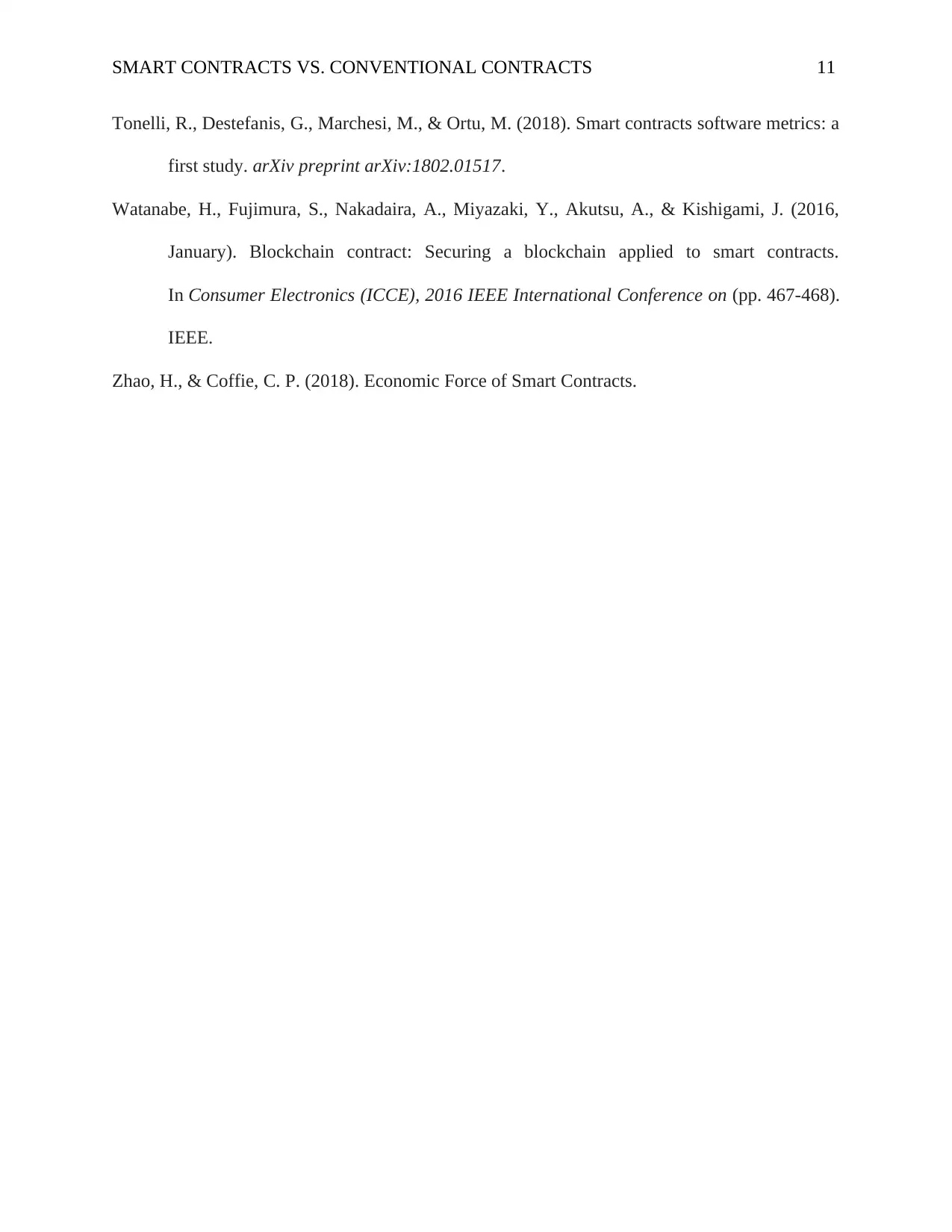
SMART CONTRACTS VS. CONVENTIONAL CONTRACTS 11
Tonelli, R., Destefanis, G., Marchesi, M., & Ortu, M. (2018). Smart contracts software metrics: a
first study. arXiv preprint arXiv:1802.01517.
Watanabe, H., Fujimura, S., Nakadaira, A., Miyazaki, Y., Akutsu, A., & Kishigami, J. (2016,
January). Blockchain contract: Securing a blockchain applied to smart contracts.
In Consumer Electronics (ICCE), 2016 IEEE International Conference on (pp. 467-468).
IEEE.
Zhao, H., & Coffie, C. P. (2018). Economic Force of Smart Contracts.
Tonelli, R., Destefanis, G., Marchesi, M., & Ortu, M. (2018). Smart contracts software metrics: a
first study. arXiv preprint arXiv:1802.01517.
Watanabe, H., Fujimura, S., Nakadaira, A., Miyazaki, Y., Akutsu, A., & Kishigami, J. (2016,
January). Blockchain contract: Securing a blockchain applied to smart contracts.
In Consumer Electronics (ICCE), 2016 IEEE International Conference on (pp. 467-468).
IEEE.
Zhao, H., & Coffie, C. P. (2018). Economic Force of Smart Contracts.
1 out of 11
Your All-in-One AI-Powered Toolkit for Academic Success.
+13062052269
info@desklib.com
Available 24*7 on WhatsApp / Email
![[object Object]](/_next/static/media/star-bottom.7253800d.svg)
Unlock your academic potential
Copyright © 2020–2026 A2Z Services. All Rights Reserved. Developed and managed by ZUCOL.
